On September 3, Russian forces struck the Poltava Institute of Communications, resulting in 58 fatalities and 328 injuries. Amidst the chaos of screams and smoke, rescuers laboured to extract victims from the debris while medics scrambled to provide critical aid. This attack was part of a troubling pattern; in the last six months alone, the Poltava region has endured five major assaults.
The full-scale invasion has now extended into its third year, with the aggressor pursuing a relentless campaign of destruction, indifferent to whether missiles target civilian, critical, or military infrastructure. The frequent air raid alerts often impede rescue operations, compounding the devastation.
Since February 24, 2024, the Poltava region has been subjected to nearly three thousand air raid sirens. This article will examine the most significant of these attacks, marking days that will be forever imprinted in the city’s collective memory.
***
September 3, 2024
At 9 a.m., the city shook with the deafening sound of rockets. One explosion, followed by another, even louder. Smoke billowed over Poltava as ambulances sped towards the scene.
Two ballistic missiles had struck the Poltava Institute of Communications and a nearby hospital. The first explosion came just two minutes after the air raid siren had sounded—leaving only a narrow window, 2-3 minutes, to reach shelter. Rescuers swiftly arrived at the impact site.
In the hour following the attack, sirens continued to wail as Russian forces attempted to hinder rescue efforts for those trapped beneath the building’s rubble.
Medics and volunteers from the Hospitallers Battalion were also on the ground. “I drove towards the smoke, knowing where it was coming from. I turned through the gates and saw a pile of bodies. In my adrenaline-fueled panic, I forgot to set the brake on my car. I jumped out, and it started to roll away. I stopped it and pressed on. The further we went, the more wounded we found. One person had three tourniquets on them,” recalled Ihor Shafarchuk, a volunteer with the Hospitallers Battalion.
Amidst the bodies, the cries of agony, and the overwhelming stench of death, time seemed to stretch infinitely, with each passing minute offering a fleeting chance to save a life.
“Emergency services and military personnel pulled bodies from the wreckage and the courtyard, placing them at a makeshift triage point under the trees. Every moment, another survivor arrived; every moment, we rushed from one to the next, applying tourniquets. People suffered up to three amputations—requiring three to four tourniquets per person,” recounted Ihor Tkachev, another medic with the Hospitallers Battalion, in a post on his Instagram page.
In the midst of the chaos, a poignant moment unfolded. A young woman, frantic and desperate, ran towards the devastation, consumed with one thought: “Is my father alive?” She found him, embraced him tightly, and broke down in tears.
Ambulances, overwhelmed by the sheer volume of casualties, worked tirelessly, ferrying the injured from the rubble. Tkachev described how, in desperation, victims were loaded into an old ZIL truck and taken across the city to hospitals. Some didn’t survive the journey. Within the hour, hospitals were at capacity, calling in medics from all specialities to handle the influx. In the first 24 hours alone, 14 people succumbed to their injuries in hospital wards.
The chief physician of the Poltava Regional Hospital, Hryhoriy Oksak, recounted the case of one of the injured who came under his care: “A young man, maybe in his twenties, arrived with isolated neurotrauma, a depressed skull fracture, and was unconscious. After surgery, I asked him, ‘Tell me what you heard and saw.’ He said, ‘There was a whistling noise right away. I knew I needed to fall, but I didn’t react. It all happened so fast.’”
Operating room nurses, overwhelmed by the sheer scale of casualties, broke down in tears. The emotional toll on the medical staff was palpable, but inside the hospitals, there was no panic. Everyone, from doctors to nurses, understood their roles and worked with calm efficiency.
All of this unfolded within sight of residents whose homes stood right next to the Communications Institute.
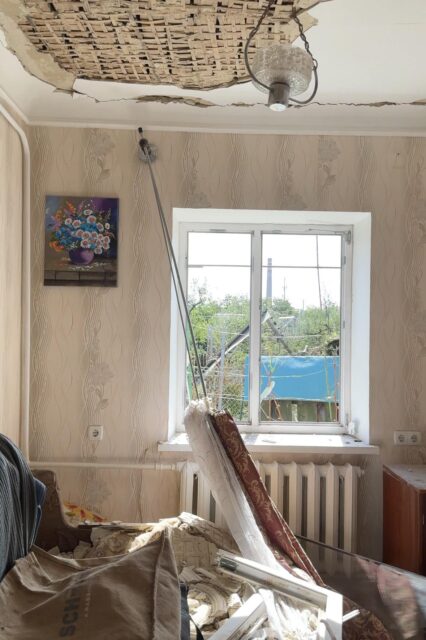
Photo: Poltava, a private house after the Russian missile attack on the city
“I was watering the flowers when I heard a hum and then a whistle. There were two explosions: one lighter, the second much stronger. After the first, I knew I had to run, so I hid in the corner, covering my head with my hands. Glass rained down on my back, shoulders, and head. There was so much crying. The first bodies were already being loaded into vehicles. It’s heartbreaking, especially seeing how young some of these men were. The real fear didn’t hit when the glass fell on me—it was when I stepped out of the yard and saw what had happened at the epicentre of the missile strike,” said local resident Nina Orlean.
The following day, the streets were eerily quiet, with scattered shards of glass littering the ground beneath broken windows. Balconies stood exposed, and residents, left without intact windows, hastily covered the gaps with plastic sheets in a makeshift attempt at protection.
On a bench outside a damaged apartment building, a man reflected on his close call: “I was in the room when it happened. My mother was in the kitchen, on the side where the explosion hit. I had a stack of cans on the windowsill—I’d just stocked up on preserves. Those cans saved her when the glass shattered. I really thought half my head was gone,” said Ihor Pcholkin, managing a smile despite the circumstances.
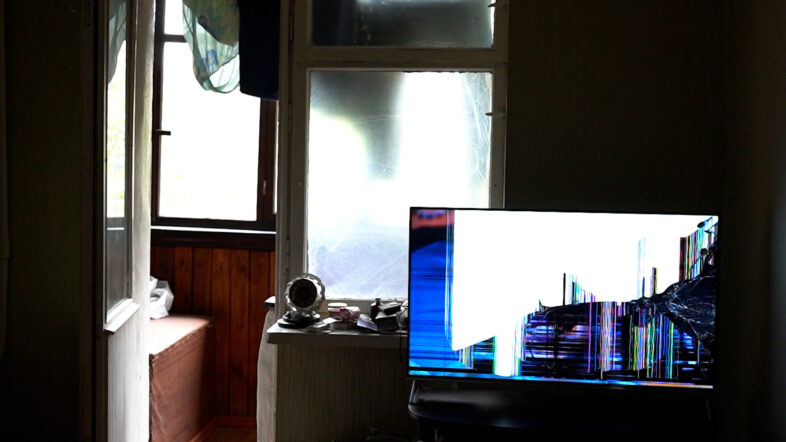
Photo: Poltava, Ihor Pcholkin’s house in the aftermath of a Russian attack on September 7
By midday, a steady stream of people began to gather, seeking help from volunteers. Aid tents were set up near the blast site, offering food. Local businesses stepped in, providing pre-packaged meals for the survivors. The solidarity among Poltava’s residents was palpable, as they gave what they could to help those in need. Young volunteers, many of whom hadn’t slept in over 24 hours, brewed coffee and tea for the exhausted. Nearby, a few rescuers, finally catching a moment’s rest, lay on the ground, taking a brief, well-earned break.
Rescue operations stretched on for three days, with the toll of casualties and injuries climbing by the hour. By 9 p.m. on September 9, the death count had reached 58, with 328 people wounded. Rescuers worked around the clock, snatching brief moments of rest on the ground beside the debris before returning to their grim task. A total of 79 State Emergency Service workers were involved in the effort.
This was far from the first time Russians had subjected Poltava to brutal shelling, terrorising its residents. The city had endured heavy strikes before—dark reminders of the occupiers’ relentless campaign.
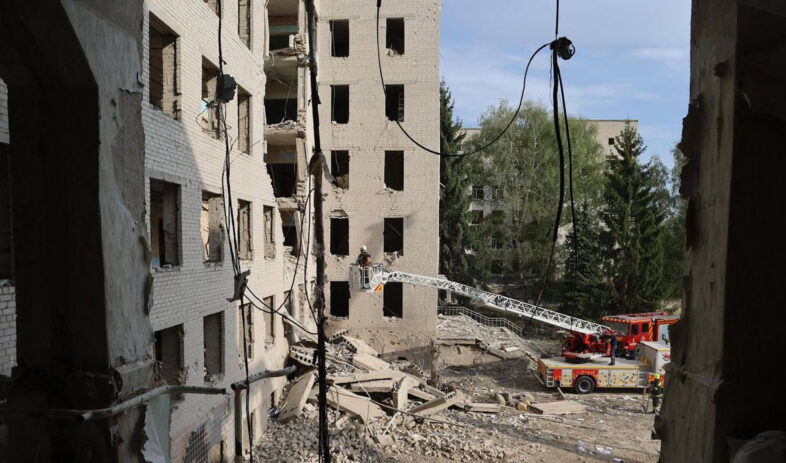
Photo: State Emergency Service of Ukraine
September 7, 2024
On September 7, Russian forces targeted residential areas in Poltava, reducing several homes to rubble. “Everything was destroyed. The bathroom was the only part of the house that survived, and that’s where I was hiding,” recounted a woman whose home was hit. “If I’d been watching TV, I would’ve been buried in glass. I’m hard of hearing, but the explosion was immediate.” Her voice cracked as she described the scene. “My husband was in the room, covered in blood. His face and leg were wounded.”
Tearfully, the elderly woman showed the devastation left behind by the strike. Fortunately, only two people required medical attention, both in non-critical condition. One was saved by the bathroom’s shelter, the other by not being home at all.
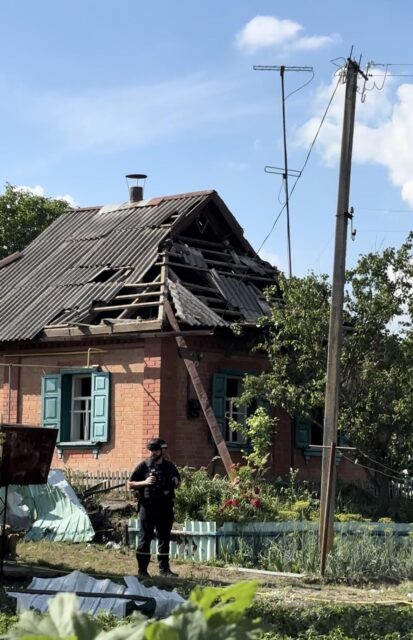
Photo: Poltava, devastation following a Russian missile attack on the city
June 17, 2024
On June 17, at 2 PM, Russian forces launched a missile strike on Poltava, targeting the Brayilky district with an X-59 missile. The explosion shattered over 1,000 windows and scattered debris across hundreds of apartments. A nearby kindergarten was also hit, and a towering plume of smoke filled the sky. Fires erupted in garages and cars as the neighbourhood reeled from the blast. Just as residents began to emerge from the shock, stepping outside, the air raid sirens blared again, warning of another potential strike.
“Glass was right next to me—just 30 centimetres away,” recalled an elderly woman, still shaken from being in her apartment during the explosion.
Twenty-two people were impacted by the attack, including nine children. The blast tore doors off apartment entrances, shattered windows and balconies, and left residents vulnerable, forcing many to sleep with broken windows to safeguard their homes from looters. The strike also damaged power lines, cutting off electricity and gas to 53,000 people. “We were without gas; it wasn’t restored until 3 PM yesterday,” one resident recalled.
In the immediate aftermath, utility workers, volunteers, and locals joined forces to clean up. They gathered glass and shrapnel, cleared rubble from garages, cut down damaged trees, and boarded up windows with plywood to make it through the night.
June 9, 2024
On June 9, Russian forces targeted residential buildings in Poltava, striking a private home. All that remained afterwards were the charred remnants of the ceiling, destroyed walls, and a scattered pile of possessions that once symbolised a couple’s life together. Firefighters extinguished the blaze within an hour and rescued a woman in critical condition from the wreckage. She had been inside resting while her husband worked outdoors when the explosion hit. As the fire consumed their home, he watched helplessly, waiting for rescuers. Though she was rushed to the hospital, the woman succumbed to her injuries the following day.
“I was home with my child when I heard a whistling sound. I thought it was an aircraft. Before I could even look up, the explosion hit. A friend’s house was completely destroyed—utterly demolished. He was lucky he wasn’t inside but out in the garden,” recalled a local resident who knew the deceased.
The blast wave also damaged neighbouring homes, mostly occupied by elderly residents. Doors, windows, and locks were blown out, and part of one house’s ceiling was torn off.
April 8, 2024
On the night of April 8, at around 9 p.m., Russian forces launched a cruise missile at the village of Suprunivka. By the morning of April 9, the air was thick with the smell of scorched metal. Shattered glass, torn personal belongings, and stunned residents marked the aftermath of yet another assault. The missile struck a two-story dormitory that housed about 30 people, leaving one person dead and 16 injured.
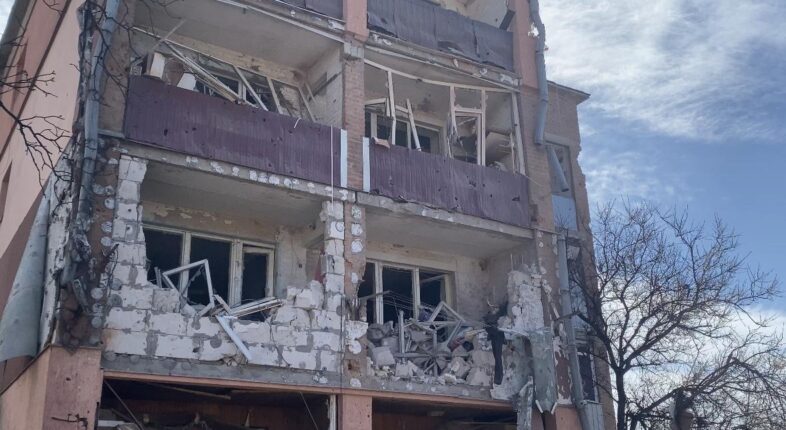
Photo: A private home in Suprunivka, devastated by a Russian missile strike
“I had just lain down because I wasn’t feeling well. Ten minutes later, there was an explosion. I knew immediately it was a missile. Glass started falling everywhere. Explosions, screaming—it was chaos. Half the building was gone, and what remained was in ruins. Cars outside were destroyed,” one local resident recalled of that harrowing night.
The blast wave from the missile lifted the roofs of high-rise buildings and shattered windows and balcony frames. The attack caused extensive damage, affecting approximately ten apartment blocks and twenty private homes. While young residents worked tirelessly to board up windows, reinstall doors, and clear debris, elderly locals, many of whom had lived alone on modest pensions, faced overwhelming despair. For several days, municipal workers laboured around the clock to aid in restoring their communities.
In Poltava, the air raid siren has become more than a mere alert—it’s a stark reminder of ongoing Russian aggression. Each wail of the siren raises the unsettling question of whether one will survive another day or face the destruction of a home that holds years of memories or whether loved ones will respond after the harrowing blast.
At the impact site, one witnesses a profound communal effort as residents expend their last resources to help each other. Amid the pain and exhaustion, there is a renewed belief that Ukrainians will persevere through this crisis.

